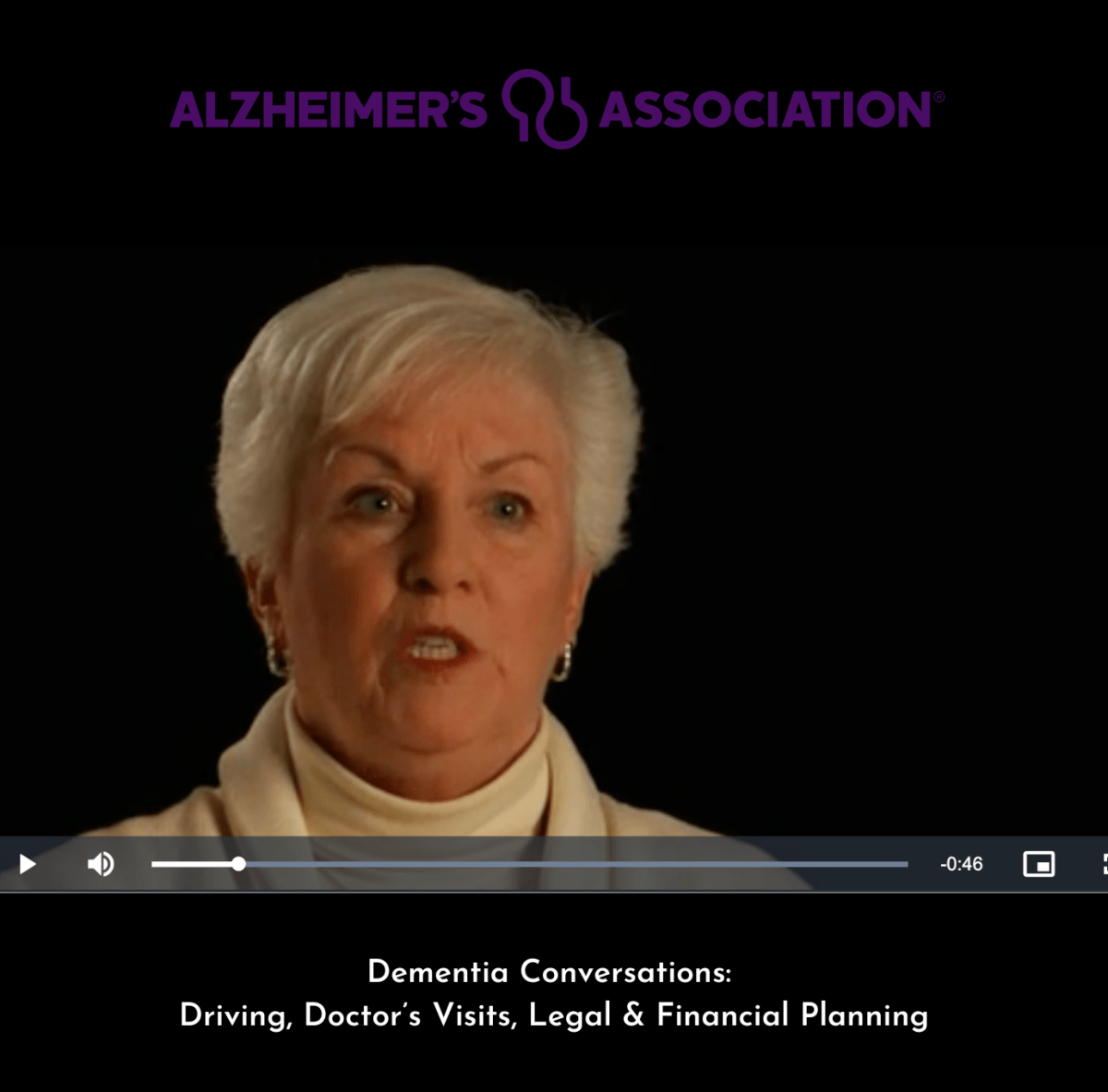Free Video Training: Driving, Doctor Visits, Legal & Financial Planning for Dementia
Free Video Training: Driving, Doctor Visits, Legal & Financial Planning for Dementia
When someone is showing signs of dementia, it’s time to talk but that can be challenging and uncomfortable. This free video training provides tips for breaking the ice with your family so you can address some of the most common issues that are difficult to discuss.
Click here to go to training and hit the purple button to add to cart at Alzheimer's Association Training Website. Then you'll be able to watch it for free!
Why we know this works
Why we know this works
We love education! It arms you with the knowledge you need to make the best decisions for you and your family. We love this coure from the Alzheimer's Association because it's from experts and from a caregiving perspective with people who have done this so you can learn from their experience. Come back to the courses again and again as things change. And all their courses are free!
How to access this resource
How to access this resource
1. Click this link: https://training.alz.org/products/4031/dementia-conversations-driving-doctor-visits-legal-financial-planning
2. At Alzheimer's Association website click purple button to Add To Cart
3. Follow the steps to get free access to the video training
Frequently Asked Questions
Frequently Asked Questions
Q: How does the free dementia conversation training work?
This video training is hosted by the Alzheimer's Association and provides step-by-step guidance for having difficult conversations with family members about dementia-related topics. You'll access the training through their website, add it to your cart (at no cost), and then watch the comprehensive video content at your own pace.
Q: What specific topics does this dementia training cover?
The training focuses on four critical areas: driving safety discussions, managing doctor visits and medical decisions, legal planning considerations, and financial planning strategies. These are the most challenging conversations families face when dealing with dementia.
Q: Who should take this free Alzheimer's Association training?
This training is ideal for family members, caregivers, and anyone who needs to have sensitive conversations with someone showing signs of dementia. It's particularly valuable for adult children, spouses, and close relatives who are noticing cognitive changes in their loved ones.
Q: Is this dementia conversation training really completely free?
Yes, this training is completely free through the Alzheimer's Association. There are no hidden fees, subscriptions, or charges. Simply click the link, add it to your cart on their website, and you'll have immediate access to watch the full training.
Q: How long is the dementia conversation video training?
While the exact duration isn't specified, this comprehensive training covers multiple complex topics including driving, medical, legal, and financial planning conversations, so you should plan for a substantial learning session that you can complete at your own pace.
Q: Can I access this training multiple times after completing it?
Once you add the training to your cart on the Alzheimer's Association website, you'll typically have ongoing access to review the content as needed. This is especially helpful since these conversations often happen multiple times as dementia progresses.
Q: What makes these dementia conversations so difficult to have?
These conversations involve sensitive topics like loss of independence (driving), personal medical decisions, financial control, and legal planning. The training specifically addresses how to approach these uncomfortable but necessary discussions with empathy and practical strategies.
Q: Do I need any special preparation before starting this dementia training?
No special preparation is required. The training is designed to help you break the ice and start these important conversations, regardless of your current comfort level with discussing dementia-related topics with your family.
Share

Solve the whole puzzle! Get more education, resources & services
-

Caregiver Training Courses
Go to website for the full training library We've partnered with Higher...
Dive Deeper: A knowledge base of solutions for real caregiving questions
View all-

What Home Modifications Do Older Adults Need to...
Discover the most important home modifications for aging in place after 65. OT-approved tips to prevent falls, improve safety, and protect independence at home.
What Home Modifications Do Older Adults Need to...
Discover the most important home modifications for aging in place after 65. OT-approved tips to prevent falls, improve safety, and protect independence at home.
-

How to Make Car Transfers Easier Without Changi...
Learn how to get in and out of a car safely using an OT-approved car transfer slide sheet. Reduce pain, effort, and fall risk.
How to Make Car Transfers Easier Without Changi...
Learn how to get in and out of a car safely using an OT-approved car transfer slide sheet. Reduce pain, effort, and fall risk.
-

A January Reset for Aging in Place: How Small H...
Noticing daily tasks feel harder after the holidays? Learn how small, OT-recommended home changes can help you age safely in place—without renovations or pressure.
A January Reset for Aging in Place: How Small H...
Noticing daily tasks feel harder after the holidays? Learn how small, OT-recommended home changes can help you age safely in place—without renovations or pressure.







